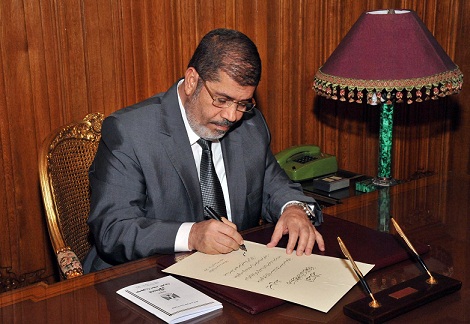CAIRO: With stamped ballots piled on the desk in front of her, rights activist Ghada Shahbandar, said “As long as I have these obtained in my hands, I cannot trust the final declared results.”
Speaking at a press conference held Saturday by the Egyptian Coalition for Election Observation, Shahbandar of the Egyptian Organization for Human Rights highlighted several incidents that demonstrated incompetence by the judicial committee supervising the elections. The stamped ballots, for instance, should only be found inside polling stations and vote counting centers and heavily guarded throughout the process.
“We imagined they’d be ready and they weren’t. … The failure of the Supreme Electoral Commission (SEC) has been evident by the late opening of some poll stations, [closed] even until 6 pm on Nov. 28, and even they admitted so,” she said, “This is very clear and terribly affects the electoral results at the end.”
The EOHR, she added, has repeatedly called for postponing the elections on the pretext of the SEC’s alleged inadequacies.
Shahbandar also contested the voter turnout figures provided by the SEC a day earlier.
“SEC said the turnout was around 8.44 million voters out of 13.61 million registered, or 62 percent,” she explained, “while in fact, the office of the Prime Minister had previously said that 17.52 million are registered, [which puts the turnout at] 48 percent.”
Her statements echoed other testimonials by international observers and Egyptian activists at the conference.
The first round of the parliamentary elections took place on Nov. 28-29. The results were partly announced on Dec. 2 and the runoffs for the individual first past the post elections are to take place on Dec. 5-6.
Steve Buckley, a specialist in media rights and freedom of expression, had a team of observers that were able to enter at least 250 poll stations, spread out in governorates of Luxor, Port Said, Damietta and Alexandria.
“We were able to witness counting operations in around 10 percent of poll stations in Egypt … what we’ve seen has been fairly consistent with the rest of the country,” he said.
He said he was able to see the ballot boxes closed and securely transported to counting stations, although they “weren’t always secure; at some point they were carried by open trucks without sufficient security.”
With the “mess” outside the polling station, he added, “almost anybody could’ve helped to carry out the boxes to the trucks.”
“The counting process appeared to proceed according to the correct procedure … but in most cases the papers were only counted once and there were considerable stages that allowed for individual dishonesty,” he also remarked.
Buckley explained that there was a lack of adequate checks and verification of the votes counted, that the process consisted of one person reading out the votes, another writing them down, then a third copying down what was written to the official documents.
“So it’s not sure if it was accurate,” he cautioned, “[but] we hope to assume that that the count of the polling stations was a precise estimate of the votes counted.”
Buckley said he and his team observed strong military presence at the poll stations, “not a familiar sight to those coming from democracies … All polling stations were guarded by soldiers with automatic rifles and tanks parked right outside.”
He also said that a lot of campaigning was witnessed right up to the moment of polling, despite the stipulated 48 hour ban.
John Suarez of the Cuban Democratic Organization raised in his hands several promotional party flyers, saying that “in addition to candidates campaigning with literature inside polling stations and literature found inside the limited voting area, some parties left it at the last minute for the voter.”
“We observed information booths of political parties near poll stations … providing information on how to vote, where to vote, and whom to vote for,” said Buckley, clarifying that most such stations belonged to the Freedom and Justice Party (FJP) although similar tactics were adopted by the Salafi Al-Nour Party and others as well.
However, he said that within the poll stations themselves the operation was fairly smooth without serious violations, except that some stations didn’t provide adequate secrecy and privacy measures for voters.
“There was a certain amount of chaos, and the judges would not be able to carefully monitor the proceedings, at some time showing not enough care,” he said.
The Coalition, however, in its concluding statement commended the process, but with reservations.
Coalition coordinator Ahmed Samih said the “good process” was marred by lack of clarity.
“In Helwan, a screenshot was taken of SEC website showing that there was a runoff between Mustafa Bakry and Ahmed Darwi, later it was declared that Bakry had won,” he said. On Sunday, an urgent court case looked into the results of that constituency.
“On many occasions the same committee has two different statements for the same case,” Samih said.

